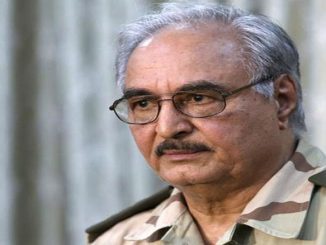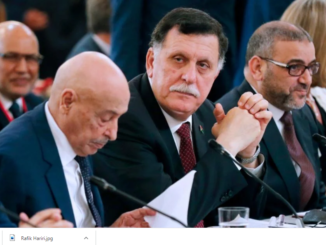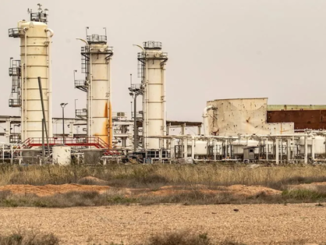
What happened on the fifth of March was a lightning surprise when Khalifa Haftar’s forces in the cities of the Oil Crescent collapsed without resistance in front of hordes of troops belonging to Benghazi Defense Brigades, affiliated to the Islamists of Tripoli.
Last Friday, the Islamist-leaning Benghazi Defense Brigades led an offensive to take the coastal cities between An Nawfaliya and Ras Lanuf in Libya’s oil crescent.
In contrast to previous attempts, which were stopped by air strikes, this time they were able to seize their objectives. This is a severe blow for Khalifa Haftar and the House of Representatives (HoR), Libya’s internationally recognised parliament.
In September, 2016, pro-Haftar forces seized the region north of Al-Jufrah known as the “oil crescent” — an area coveted by the Benghazi Defense Brigades, which is loyal to Libya’s Tripoli-based Presidential Council.
“The Government of National Accord (GNA) that is backed by the United Nations has produced a new situation in Libya, that is, only the GNA under Fayez Al-Serraj is granted legitimacy as the sole representative of the Libyan people,” said Wael Ali Nasr al-Din in a report on Masr al-Arabiya news website, adding, “On this basis, the troops supported by the Government of National Accord moved to get rid of the Islamic State (Daesh) terrorists with substantial international support from two main axes: a) from the east, depending on oil installations guards, b) and from the west depending on Misrata forces. Accordingly, Sirte was officially liberated from Daesh in December 2016.”
When Khalifa Haftar seized the oil crescent area in September, he deprived the legitimate government of using its oil and thus blocking the main source of income for the Libyans. But three months later, the oil crescent region collapsed at the hands of the so-called Benghazi Defense Brigades, who announced they were not interested in the oil, and handed the area over to the legitimate GNA.
Why was Hafter defeated last Friday?
The causes of Haftar’s defeat can be summed up in the following points:
- Haftar’s total rejection of national consensus and his adoption of a regional polarization discourse
In fact, Khalifa Haftar has implicated himself in a regional war which prevented him from uniting the Libyan people behind him. He allowed his TV channels to promote a racist discourse against the residents of some Libyan cities as well as some social components; making these social components challenge Haftar’s existence (as a military power) and consider it a matter of life or death as long as he threatens their own existence. However, Haftar insisted on only one scenario, that is, attempting to impose the military governance model of Egypt’s Al-Sisi in Libya by force. In fact, this is impossible because different Libyan forces are almost equal in power, and no party has the ability to exclude other parties by force as Al-Sisi did in Egypt. - The severe economic crisis in Libya
Hafter also implicated himself too much through his failed attempt of launching an economic war on the people of Misrata (his strongest opponents), and the transfer of the Central Bank from the capital Tripoli to the east of Libya, in order to put pressure on his opponents who control the capital and the state institutions there. To increase the pressure on his opponents, Haftar issued a new bankenote in Russia, which was known as (Haftar’s banknote).However, Haftar forgot the fact that ‘legitimacy’ has become with his opponents, that eastern Libya areas depended on western Libya in 80% of their living needs, and that by his ‘economic war’, he was besieging his supporters in eastern Libya rather than putting pressure on his opponents
- Erosion of the regional front that backed Haftar
When he announced Operation Dignity or his coup in February 2014, in fact, Haftar announced this from outside the Libyan territory, specifically from Egypt and the United Arab Emirates, when the two countries as well as some Gulf States were fighting against the Muslim Brotherhood and the Arab Spring in general. However, after Iran’s nuclear deal with the US, the Gulf countries focused on the war against Iran, especially in the presence of Saud Arabia’s new King Salman, who has strengthened the Kingdom’s relations with Turkey and Qatar (Haftar’s main enemies).As for the Egyptian government, although it says it is at war with the Muslim Brotherhood everywhere, however, its calculations have completely changed with the advent of the Government of National Accord (GNA), and the latter’s success in defeating Daesh in Sirte. The new strategy of the Egyptians in Libya has become attempting to strengthen the Libyan internal front as a whole to stand against Daesh.Therefore, the Egyptian leadership has received all the Libyan rival parties, including members of the General National Congress (close to the Islamists). It is also said that the Egyptian regime proposed to Fayez al-Serraj, during his recent visit to Egypt, a comprehensive settlement between the leaders of Misrata City and Khalifa Haftar, but was rejected by Haftar, who even refused to meet al-Serraj or talk with him.
- Many Libyan tribes in the east abandoned Haftar
Khalifa Hfter has failed to keep tribes in eastern Libya together around him by his insistence on adopting the same dictatorial governance model of Al-Sisi of Egypt. Also, Haftar’s crackdown on some prominent tribal figures in the east, especially from Al-Abaydat and Al-B arasa tribes, aroused the anger of some eastern Libya tribes who used to support Haftar in the past. - Granting extraordinary powers to Salafists
Haftar made major concessions in favor of the Salafi movement in order to help him in his war on the Muslim Brotherhood. Salafists were allowed to control the Libyan mosques in the east for mobilizing people against the Brotherhood. Moreover, they infiltrated into the security institutions and had their impact on Haftar’s social policies.. Among Haftar’s most prominent concessions to the Salafists was his latest decision to ban Libyan women’s travel abroad without a “mahram” (husband, father, brother, …).
Will Haftar regain his strength?
Of course, Haftar still has many strengths. His most important point of strength is the endless support that he gets from Al-Sisi in Egypt and the United Arab Emirates. But time is not in favor of Haftar, as the forces of his opponents have approached the cities of eastern Libya for the first time since his army was close to the city of Sirte.
However, no party could win the war in Libya, as the international community still believe that any likely solution for the Libyan crisis should be based on a consensus among rival parties, as well as achievement of national reconciliation.



